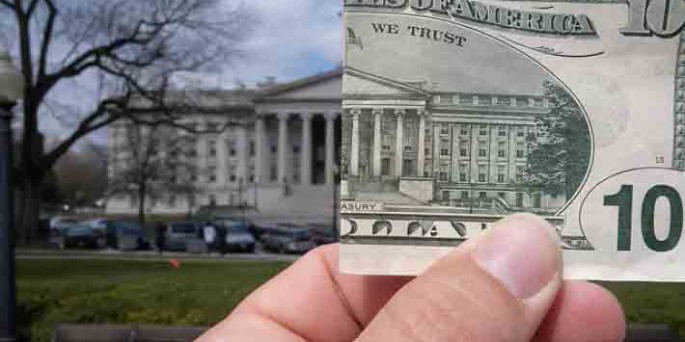
The praxis of plutocracy
Each year Republicans in Congress bring the country to the edge of default. The usual excuse for manufacturing such bogus crises is the deficit. The government is spending beyond its means; the debt is unsustainable; we may end up like Greece!
Such have been the alarmist and fallacious arguments used by the GOP to scare a portion of the American people into accepting the real Republican agenda of massively shifting wealth and income to the top by drastically cutting spending on programs that benefit the middle class and the poor, indeed cutting virtually all government services including the post office with the sole exception of a colossal military-industrial-intelligence complex to ensure world domination.
The truth, however is that the deficit bogeyman too is a manufactured pseudo-problem created by a system that not only taxes the rich at scandalously low rates but also enables corporations to engage in massive tax avoidance by relocating abroad on paper only and reporting profits made in this country as being realized in a low corporate tax country.
There is, in short, no shortage of money for social needs and investments in education and infrastructure–if only the government chose to collect it from the people and corporations that can easily afford to pay it.
The corporate-speak term for the shell game played by corporations to avoid taxes is “inversion.” Inversion betrays obvious signs that it is essentially a con game, though a legal one That’s the case, for instance, when a small foreign company “buys” an American corporate giant. What, a sardine can swallow a whale? Not in nature but in law it can in order that the U.S. company can incorporate abroad and avoid U.S. taxes. Another anomaly is that the top executives of the U.S. company stay in this country and the company continues to carry on business as usual, most often as a subsidiary of the much smaller foreign corporation.
The most damning fact of all is that all of this is legal. It often has been said that what is really amazing is not what is illegal but the outrages that are deemed legal. U.S. tax laws consider the practice of inversion as tax avoidance, which is not a crime, instead of tax evasion, which is.
That distinction is lost on most Americans, who must pay through the nose in income taxes plus the regressive social security tax. But few know much if anything about inversion or its vast scale and significance. Such ignorance is not surprising. The power of plutocracy is the power to conceal. To fly under a different color (democracy) is vital to its survival.
The main consequences are that the teacher, the computer analyst as well as the doctor and the lawyer have to pay the taxes the corporations avoid and the country’s social safety net and physical infrastructure are starved for money and begin to fall apart.
Concealment is not possible to maintain forever, and lately politicians and social critics have outed the scheme. President Obama called inversion “unpatriotic.”
But the efficacy of democratic rhetoric is one thing and the praxis of plutocracy quite another. The amount earned abroad by America’s top 1,000 companies jumped by 8.6 percent between 2013 and 2014 alone, according to a study by the accounting research company Audit Analytics and reported in the New York Times. This group of companies held $2.3 trillion dollars in earnings abroad, according to the study. The real number is probably even larger as the practice of parking corporate money abroad has accelerated since the study was carried out and because the research did not cover the marginally legal or outright illegal ways in which companies use foreign connections and identities to avoid taxes.
Corporate tax savings from inversions, moreover, don’t come mostly from acquiring a corporate address and reporting profits in tax havens, although that is part of the story. According to a different study reported elsewhere, the bigger source of tax savings is an even more dubious and devious practice known as “tax stripping.” It involves intracompany loans and other transactions that make it appear as if profits are being made abroad when they are being made here. This too is, apparently, legal.
The Times report, written by Jeff Sommer and appearing in the Sunday business section, concludes that, even if inversions were outlawed, an unlikely prospect in a plutocracy:
“…the United States still faces a gigantic problem. American companies are hoarding money overseas and avoiding United States taxes without inversions. Unless the laws change, it is difficult to imagine them bringing all that money home.”
The damage inflicted on the American economy and society by the absence of all that money is huge, although only one of the ways plutocracy harms this country. But it is significant in itself as well as a good example of how plutocracy works.
Why do the American people, in a nominally democratic country, let corporations get away with all this and more? A major part of it is obfuscation, muddying the waters and manipulating people relentlessly. But that’s the subject for another article. This one concludes with a very partial list of what could be done with all that money parked abroad.
All that money could pay for wage increases for the average worker who has seen no change in his or her paycheck even as profits soar. That wage increase would in turn stimulate the economy, create jobs, and make the country more prosperous. All that money could be used to make sure every person living in this country gets decent health care.
All that money, in sum, would make a difference in making this society a more decent and just one. But that’s not where the priorities of the plutocracy lie nor the policies advocated by its political pawns.

